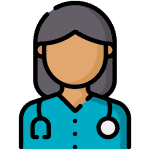aprax•ia | uh–prak-see-uh
Acquired apraxia of speech is a speech disorder that makes it difficult to make the necessary motor movements to speak. Apraxia is a neurological condition. People who have the condition have normal muscles, but the brain pathways involved in speech are affected.
If you have apraxia, you know what you want to say, but you have difficulty positioning your lips, jaw, or tongue to move in the proper way to say it. If you have trouble with just a handful of words, you likely have a milder version of apraxia. In some cases, apraxia can be severe enough that you cannot communicate effectively by speaking.









